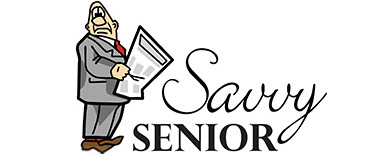|
|
Savvy Senior Seminars
 Savvy Senior syndicated columnist and NBC Today contributor Jim Miller will be in the Tampa, Fla. area Feb. 26, 27 and 28 presenting free educational Reverse Mortgage seminars to seniors and their families. To learn more about these events or to request free information on reverse mortgages call 800-445-2449.
The Savvy Senior reverse mortgage seminars are sponsored by Bank of America, an Equal Housing Lender.
The Savvy Senior
Reverse Mortgage Tutorial
Over the years reverse mortgages have been considered loans of last resorts, only for financially desperate seniors. Not anymore! The reverse mortgage industry is booming, helping retirees from all walks of life, use their homes to help fund their retirement.
Understanding Reverse Mortgages
 A reverse mortgage is a unique loan that lets older homeowners convert part of the equity in their home into tax-free income that doesn't have to be paid back as long as they live there. But who's eligible? How much can be borrowed? What does it cost? And is this right for you? Here are the key points on a how reverse mortgage works and where you can find help:
- Eligibility: To be eligible you must be at least 62 years old, own your own home and currently be living there. There is no income qualification. Property eligibility includes single family homes, 2-4 unit properties, condominiums and townhouses. Even if you have an existing mortgage, you're still eligible, but you must be able to get enough from the reverse mortgage to pay it off.
- Ownership: With a reverse mortgage, you, not the bank, own the house, so you are still responsible for property taxes, insurance and repairs. And, how you choose to spend the money from the loan is up to you.
- Types of Loans: There are two basic types of reverse mortgages. The FHA insured Home Equity Conversion Mortgage (HECM), which accounts for about 90 percent of all reverse mortgages on the market. (HECM's limit how much of the home's value you can tap, ranging from $200,160 to $362,790.) And conventional reverse mortgages, also known as jumbo loans, which are better suited for seniors with higher valued homes - over $500,000 - because they offer larger loan amounts.
- Loan Costs: The main drawback of reverse mortgages is the hefty up-front fees - a 2 percent lender origination fee, 2 percent mortgage insurance, along with appraisal fee, closing cost and other miscellaneous expenses. All told, the cost of getting a HECM can run around 5 percent of the value of your home. Conventional reverse mortgages are generally more expensive. (Note: Most up-front fees can be added to the loan balance, so you'll have no out-of-pocket cost at closing. Instead, the fees can be paid back with the rest of the mortgage when the house is sold.)
- Loan Amounts: The amount you get through a reverse mortgage depends on your age, your home's value, where you live and the current interest rates. Generally, the older you are, the more your house is worth, and the lower the interest rates are, the more you can borrow. To calculate how much you may be able to borrow with a HECM visit www.rmaarp.com. You can calculate conventional reverse mortgages on the Web sites of the financial institution you're considering.
- Payment Options: You can receive the money from a reverse mortgage in a lump sum payment, a line of credit to use only when you need it, regular monthly checks as long as you choose, or a combination of these.
- Loan Repayment: A reverse mortgage does not have to be repaid until you or the last surviving borrower permanently moves out of the home or dies. Then you or your heirs will have to pay off the loan (which includes the money you actually borrowed plus accrued interest and fees) either with the proceeds from selling the place, or if they want to keep it, with money from another source. But, you or your heirs will never owe more than the value of the house.
- Counseling: Before applying for a reverse mortgage, you need, and are required, to first meet with an independent counselor who will spell out the pros and cons, as well as the alternatives (it's free). To find one in your area call the AARP Foundation's Reverse Mortgage Education Program (800-209-8085), the National Foundation for Credit Counseling (866-698-6322), or Money Management International (877-908-2227).
- Tax-Free: The money you get from a reverse mortgage is tax-free and won't affect your Social Security or Medicare benefits, but it may affect eligibility for certain kinds of government assistance, such as SSI and Medicaid. Be sure you check.
- Reverse Lenders: Reverse mortgages are offered by both banks and mortgage lenders. Do some homework and cost comparing before you choose one. To help you find a lender talk to your reverse mortgage counselor or visit www.reversemortgage.org.
- Other Options: There are ways, other than taking a reverse mortgage that can turn your home equity into income. You could sell your house but you'll have to move. Or you could borrow against your home (a home-equity loan) but you'll have to make monthly loan repayments. Nothing is perfect!
The Bottom Line
For seniors who own their own home, or have a lot of equity built up in their home, but could use some extra money to supplement their retirement, and want to stay living in their home for a good long while, a reverse mortgage is a valuable tool to consider. However, if you plan to move within a year or two or if leaving your home or money to your children or other heirs is important to you, a reverse mortgage may not be your best option.
Savvy Tips: To learn more about reverse mortgages visit www.aarp.org/revmort, or call 800-209-8085 and order their free booklet "Home Made Money." Also check out www.reverse.org and www.reversemortgage.org.
|
 Savvy Senior syndicated columnist and NBC Today contributor Jim Miller will be in the Tampa, Fla. area Feb. 26, 27 and 28 presenting free educational Reverse Mortgage seminars to seniors and their families. To learn more about these events or to request free information on reverse mortgages call 800-445-2449.
Savvy Senior syndicated columnist and NBC Today contributor Jim Miller will be in the Tampa, Fla. area Feb. 26, 27 and 28 presenting free educational Reverse Mortgage seminars to seniors and their families. To learn more about these events or to request free information on reverse mortgages call 800-445-2449.







 A reverse mortgage is a unique loan that lets older homeowners convert part of the equity in their home into tax-free income that doesn't have to be paid back as long as they live there. But who's eligible? How much can be borrowed? What does it cost? And is this right for you? Here are the key points on a how reverse mortgage works and where you can find help:
A reverse mortgage is a unique loan that lets older homeowners convert part of the equity in their home into tax-free income that doesn't have to be paid back as long as they live there. But who's eligible? How much can be borrowed? What does it cost? And is this right for you? Here are the key points on a how reverse mortgage works and where you can find help: